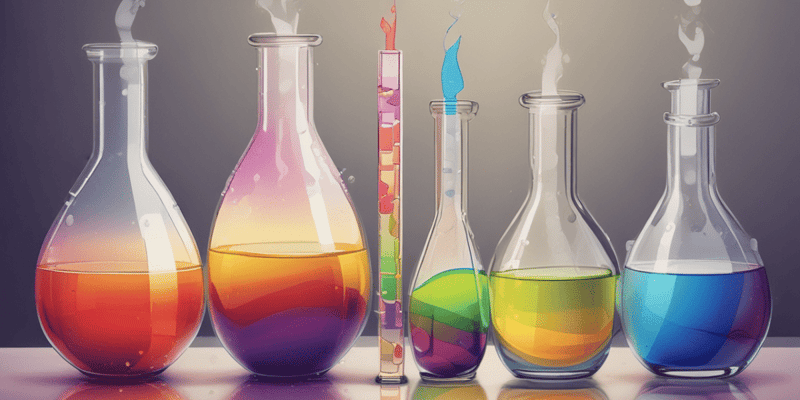Questions and Answers
What is the main principle behind chromatography as a separation technique?
Which type of chromatography is specifically suitable for volatile compounds?
What defines the stationary phase in chromatography?
What is a significant advantage of chromatography for analysis?
Signup and view all the answers
One limitation of chromatographic techniques is that they may require:
Signup and view all the answers
Study Notes
Chromatography Techniques
1. Introduction to Chromatography
- Technique for separating mixtures into individual components.
- Based on differences in partitioning between a stationary phase and a mobile phase.
2. Types of Chromatography
-
Liquid Chromatography (LC)
- Uses a liquid mobile phase.
- High-Performance Liquid Chromatography (HPLC) is a common form.
-
Gas Chromatography (GC)
- Utilizes a gas mobile phase.
- Suitable for volatile compounds.
-
Thin-Layer Chromatography (TLC)
- Uses a solid stationary phase with a liquid mobile phase.
- Quick, qualitative analysis.
-
Column Chromatography
- Involves a packed column where the separation occurs.
- Can be performed with either liquid or gas phases.
3. Key Concepts
-
Stationary Phase
- The phase that remains fixed in place.
- Can be solid or liquid depending on the type of chromatography.
-
Mobile Phase
- The phase that moves through the stationary phase.
- Can be a gas or liquid.
-
Retention Time
- Time taken for a component to pass through the system.
- A key parameter for identification and quantification.
4. Applications
-
Pharmaceutical Analysis
- Purity testing, stability studies, and identification of compounds.
-
Environmental Testing
- Analysis of pollutants and contaminants in air, water, and soil samples.
-
Food and Beverage Industry
- Detection of additives, preservatives, and contaminants.
5. Advantages
- High sensitivity and specificity.
- Capability to analyze complex mixtures.
- Versatility in applications across various fields.
6. Limitations
- May require extensive method development.
- Equipment can be costly and requires maintenance.
- Certain techniques may have limitations on sample size and type.
7. Future Trends
- Increasing automation and miniaturization (e.g., microfluidics).
- Development of greener chromatographic techniques to reduce solvent use.
- Integration with mass spectrometry for enhanced analysis capabilities.
Introduction to Chromatography
- Separation technique that divides mixtures into individual compounds.
- Operates based on differing affinities between stationary and mobile phases.
Types of Chromatography
-
Liquid Chromatography (LC)
- Employs a liquid as the mobile phase.
- High-Performance Liquid Chromatography (HPLC) is a widely used variant.
-
Gas Chromatography (GC)
- Uses gas for the mobile phase.
- Ideal for volatile compounds.
-
Thin-Layer Chromatography (TLC)
- Features a solid stationary phase combined with a liquid mobile phase.
- Provides rapid qualitative analysis.
-
Column Chromatography
- Consists of a packed column where separation takes place.
- Applicable to both liquid and gas phases.
Key Concepts
-
Stationary Phase
- Fixed phase that can be solid or liquid, depending on the chromatography type.
-
Mobile Phase
- The phase that traverses the stationary phase, available as either gas or liquid.
-
Retention Time
- Refers to the duration a component takes to pass through the chromatography system.
- Crucial for the identification and quantification of substances.
Applications
-
Pharmaceutical Analysis
- Used for purity testing, stability evaluations, and compound identification.
-
Environmental Testing
- Detects pollutants and contaminants in air, water, and soil.
-
Food and Beverage Industry
- Identifies additives, preservatives, and contaminants in food products.
Advantages
- Offers high sensitivity and specificity in analysis.
- Capable of handling complex mixtures effectively.
- Versatile applications across diverse industries including pharmaceuticals and environmental science.
Limitations
- Often requires extensive development of methodologies.
- Equipment is typically expensive and necessitates regular maintenance.
- Some techniques may face constraints regarding sample size and types.
Future Trends
- Growing emphasis on automation and miniaturization, including advancements in microfluidics.
- Shift towards greener chromatographic methods to minimize solvent usage.
- Enhanced integration with mass spectrometry to boost analysis capabilities.
Studying That Suits You
Use AI to generate personalized quizzes and flashcards to suit your learning preferences.
Description
This quiz covers the fundamental techniques of chromatography, including the types such as Liquid, Gas, Thin-Layer, and Column Chromatography. Learn about key concepts like stationary and mobile phases that are essential for understanding the separation of mixtures. Test your knowledge and enhance your understanding of these important analytical methods.




